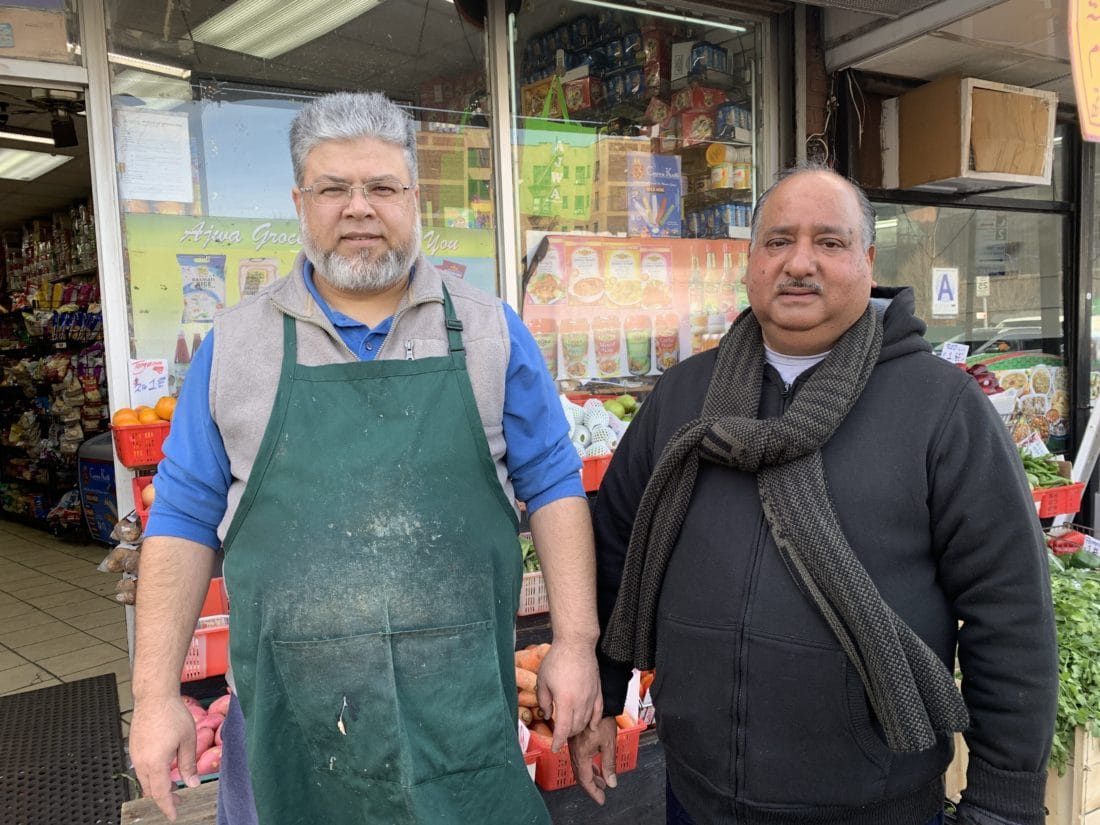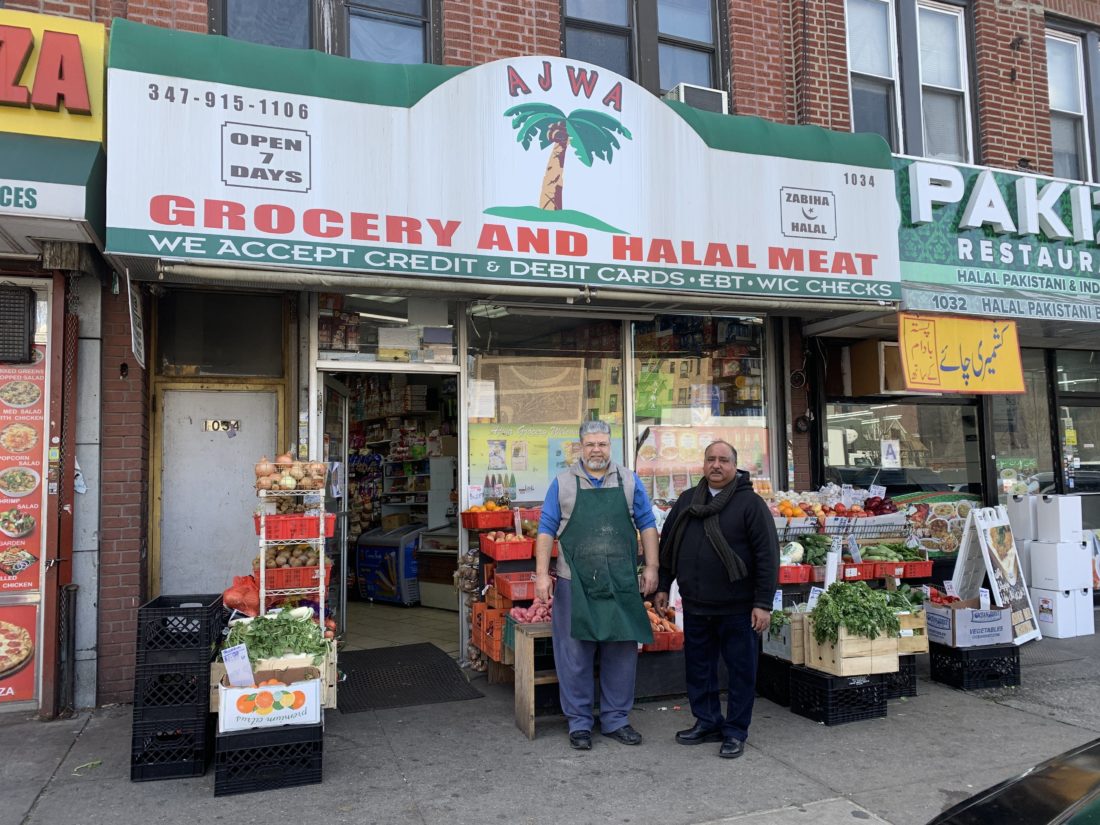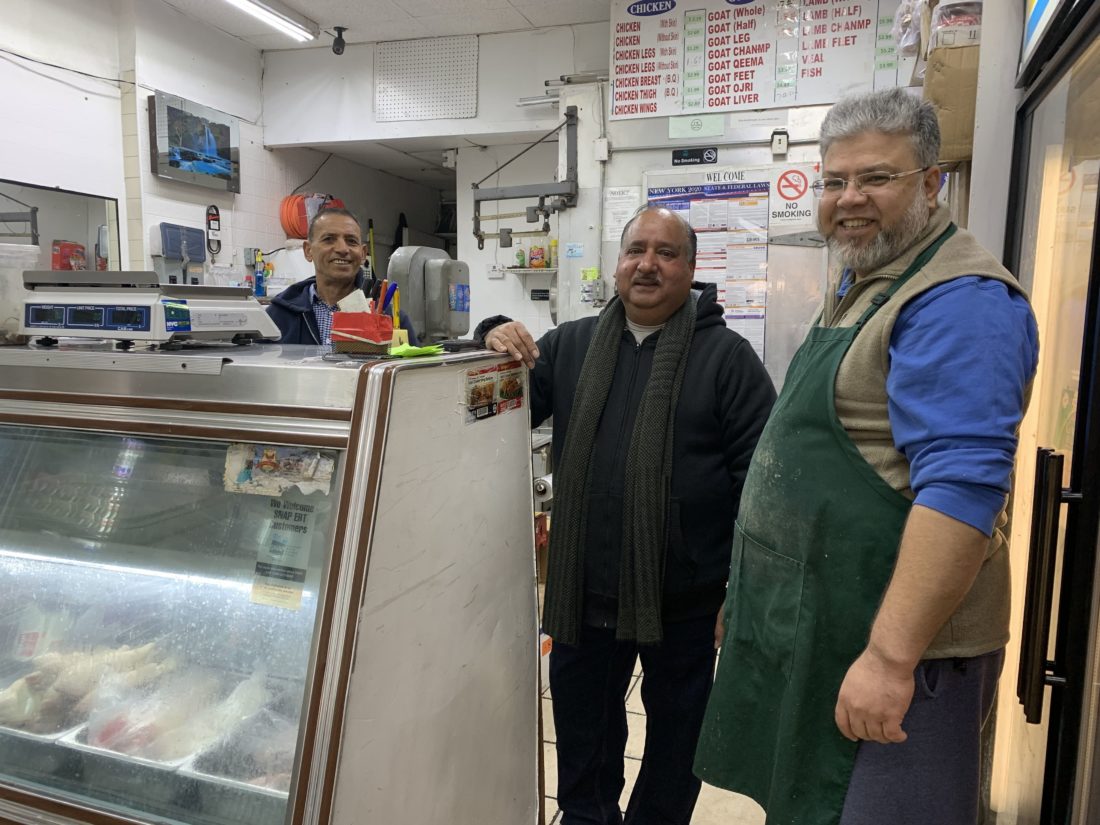Essential Business: Ajwa Grocery Carries On


On ordinary days, the AJWA Grocery at the intersection of Coney Island and Foster Avenues in Midwood, does a lively business. Catering to a largely Pakistani, Bangladeshi, and Indian clientele, and a growing Uzbeki community, customers come for the well-stocked shelves of grains, beans and basmati rice, the tropical nectars, imported spices, and dates. The Ajwa date tree, after which the grocery is named, spreads its fronds all over historical Islamic literature. They come for the spiky kerala squash and specialty products like Jasmine hair oil, mango ice cream, and my favorite tea in the pink tin: rose chai. They also come for the halal meat counter in the back.
Business as Usual (Sort of)
But these are not ordinary days, and I wonder what it’s been like lately for Imran, the manager at the front counter, on the phone, in gloves, and packing groceries next to four credit card readers? After all, grocers are “first-responders” too—putting their own health at risk to feed their communities. As a sub teacher, I once taught Imran’s kid Rahin for three months. We’ve heard about the alleged price-gouging of Purell by New York City shopkeepers looking to profit off panic, but that’s not what I’m seeing here in Imran’s dairy case. Whole milk yogurt is still three bucks, and a gallon of milk—still three bucks and change. And both are still available from nine-thirty in the morning until eleven o’clock at night.
“Your suppliers are still coming?” I ask Imran.
“Step by step, it’s coming. Yesterday, the rice is coming. Before yesterday, the flour is coming. Today, some is coming. Tomorrow, some is coming. No problem.”
“Still lots of customers?”
“Not too many. We’re delivering.”
Goat is scarce—Chicken Rules the Roost
Imran goes back to taking his phone order, and I walk to the back, to the meat counter. Three butchers break from cleaning knives and countertops to give me a few minutes. Usually, this is a bustling time of day, but it’s slow now, as schools are closed and families self-quarantine.

“Right now everyone is panicking. They’re buying everything. But the only thing we’re short on is atta,” says butcher Shahid Haider, who lives around the corner now. He came here in 2004 from what he describes as “the problem area”, between India and Pakistan, two hours from Islamabad. He’s talking about atta flour, the stoneground staple of East Asian households used to make roti, or chapati, whole-wheat griddle bread. Ajwa Grocery is down to one 20lb bag.
“That’s what everybody’s looking for, and they’re still coming.”
“Do you see any similarities between life in Pakistan and what’s been going on here?”
“Basically we are dealing with subcontinent customers. They are still the same,” Shahid chuckles, “over here or back home, for panic situations, they behave the same.”
“What are you doing to protect yourself and your customers Shahid?”
“Basically, we are educating everybody to keep a little distance. I wash my hands, we’re taking all precautions.”
And so far, Shahid is nowhere close to acting panicky himself. Meat deliveries have been regular. But over on Third Avenue this morning, where Shahid sometimes picks up a few cuts to tide them over til the afternoon delivery, he tells me that for the first time, everything was already gone when he got there.
“Our regular supplier says they have meat though, and they’re bringing it on time today.”
“What are you selling most of right now?” I ask Rashid Ansari, the butcher who makes me delicious chicken patties that I throw on the grill in summer—hand-formed with fresh peppers and spices.
“Chicken only,” he answers.
“Goat’s gone?” I ask.
“Goat’s gone. Beef’s gone.”

The Elderly
“What about the elderly, are people shopping for their neighbors?” I ask.
“The good thing for the elderly people is their own children are taking good care of them. They buy everything for them,” says Shahid.
Naat
I’m suddenly aware of an angelic voice that’s been holding lovely notes since I entered.
“What are we listening to now?” I ask.
“We call it Naat. Basically we are saying good words about our prophet.”
“Right. We would call that praise music,” I observe. “And this just runs throughout the day?”
“The whole day, every day. When we open up the store, the first thing we do is recite the Koran for half an hour. After that, the Naat plays the whole day long.”
I sense the Naat helps carry the manager and butchers through their day, and accounts for the cloak of calm, which is always my experience in this store, in trying times or not.
“What do you think of Brooklyn, Shahid?”
“Brooklyn is the nicest place. Over here all communities are living very peacefully. That’s why I like Brooklyn. Brooklyn is the best.”
I turn back to Rashid, “You’re here until what time at night?”
“10 o’clock: finish.”
“How are you feeling right now? Tired, right?
Rashid’s kind eyes, drooping a bit and shadowed, crinkle up: “Yea, twelve-hour days.”
“How are the customers treating you?” I ask. “Have they been nice or pushy this past week?”
Rashid giggles. I get my answer.
I’ve taken up enough of their time, and I bought chicken yesterday, so I’m good.
“Well thank you all so much for feeding us; that’s important.” It sounds like both the stupidest and most important thing I’ve ever said. One more question:
“Rashid, would you like to say anything to our community during this difficult time?”
“He says don’t get worried,” Shahid helps Rashid match words to sentiment. “Everything will be good by the –d willing.”
AJWA Grocery: 1034 Coney Island Avenue. Open 7 days, 9:30AM-11:00PM.
Tel: (347) 915-1106. The butcher is open daily, 11AM-10PM, until 9PM on Mondays.



